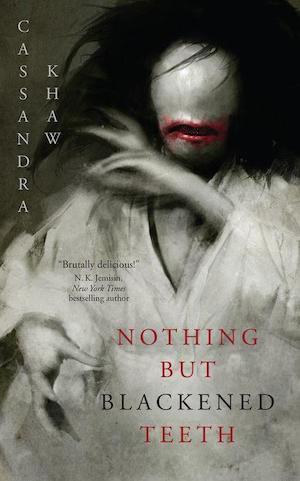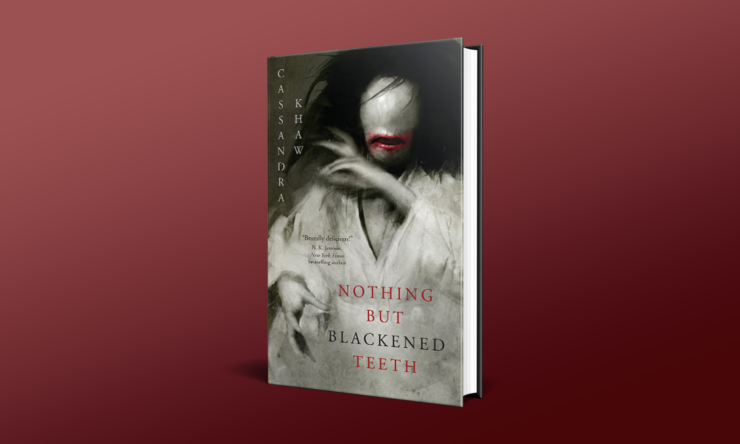To celebrate an upcoming wedding between two of their number, a group of friends who grew up together in Malaysia reunite to spend one night in a crumbling Heian-era manor house. Ghostly thrill-seeking used to be their lifeblood, so an ancient mansion built on the bones of an entombed bride-to-be and more than two hundred companion girls holds a certain appeal. After all, what better place could there be to prepare for a marriage and blow an obscene amount of their near-billionaire friend Phillip’s inheritance?
However, the drawing together opens old wounds—jealousies, romantic failures, abandonments, privileges and cruelties—especially for Cat, who’s fresh off a six month long recovery from a serious depressive episode. But histories far nastier than their interpersonal squabbles lurk within the creaking foundations of the manor house… and the ghost of a centuries-dead bride has designs on the guests interrupting her estate’s moldering quiet. She’s bound to be getting a little lonely, buried down in the dirt.
Nothing but Blackened Teeth fills the mouth like a big bite of tendon—meat that requires chewing with all the muscle in your jaw, mixing savor with a visceral density. As a novella, of course, “one big bite” is especially apt. At the exact moment the brutality of the climax started to provoke the first wash of nausea for me, the grisly tension unspools and the remainder can be swallowed whole.
Spoilers follow.
Buy the Book


Nothing But Blackened Teeth
Khaw has a truly deft hand at crafting gruesome poetics within their prose fiction. Whether it’s the sensation of sipping from a water bottle to find it clogged with algae and old hair, or watching a friend use his fingernails to dig loose his own tooth roots and all, or devouring a sumptuously marrow-fatty wedding/funeral meal… the novella’s world is a felt world, one the characters engage through their bodies. It’s as nasty as it is delicious, as much rotten as sweet.
For a good example of “things people feel in the flesh,” Cat’s impressions of the ghost of the manor carry a deeply queer sensuality. When she’s embraced by the creature, an erotic flicker twitches through the prose. She’s overcome with thoughts of skin rupturing and compressing, penetration and liquidity all squished together. Then once again, near the end at a pair of show-stopper lines, Khaw flips neatly from the sexiness of death to the fear of it:
I wondered for a second what the mixture would taste like, if it’d be like kissing copper from the ohaguro’s tongue, if I could content myself knowing the last person I kiss was a dead woman’s ghost.
“This is the part where we all die,” Lin whispered.
No one is surprised, I’m sure, to hear me gush about gorgeous prose that’s off the charts in the raw physicality department. Nothing but Blackened Teeth certainly buried me in miserable splendor, there. Though I began reading sitting on the porch in broad daylight, I ended up waiting for nightfall to finish in the interest of letting the text do its darkest work. Khaw’s incisive skills of observation, both of their characters and the world those characters inhabit, leads the reader into a fascinating muddle of loathing and despair and trapped-ness. Sure, there’s a haunted mansion enclosing them… but their faltering mid-twenties relationships are the stickier, uglier spider’s web.
Our protagonist, Cat, has been drawn back into her group of friends after an implied suicide attempt and long therapeutic recovery. Those ‘friends’ range from Phillip, the white rich guy with his football-hero charms, to the central couple Talia and Faiz whose relationship emits an almost-septic miasma of jealousy, to Lin, the jokester Cat seems to care most for—but who abandoned her completely and got married during her low period. Within their codependent huddle, Phillip has slept with both Talia and Cat; Cat used to date Faiz; Talia and Faiz blame their prior near-breakup on Cat, though she insists her suggestion they split was based on their unhappiness. Furthermore, Cat’s feeling of being unstuck—cut loose from her academic pursuits and from love—receives Lin’s settling into a simple married domestic life about as well as sandpaper on a blister.
Which brings me to the other aspect of Nothing but Blackened Teeth that made me wriggle with delight: the merging and twisting of several generic forms into one dense, scary package. Khaw effortless interweaves source materials from the gothic to youkai tales, spooky traditions such as hyakumonogatari kaidankai to literary tropes about “loathsomely rich twenty-somethings and their murderous interpersonal drama.” And, more to the point, they explain none of those wellsprings to the audience. You’re either going to come along, or you aren’t. I appreciate being required to engage with a text on multiple levels—and Khaw’s novella allows the reader to dig as deep or coast as light as they like.
While it’s going to be upsetting and scary no matter what, the tapestry of background materials contributes a supremely cool richness to the themes and resonances of the novella. As a fan of Japanese horror, though by no means any kind of expert, one implication I ended up gnawing on arose from the arrangement of the brutal climactic events. Because ohaguro bettari aren’t necessarily a threat to humans past their personal pride, within the scope of the usual youkai stories. Frightful and disorienting, fans of messing with their victims for sure, but less of an… immediately consuming danger, shall we say?
People, on the other hand—people are an immediate danger.
As parades of creatures bulge against the walls of the mansion, coming to life across the ancient painted screens, none of them interfere directly with the humans. Aside from the bride snatching and attempted ghost-human marriage trick, the supernatural inhabitants don’t do a single thing to their intrusive guests… other than provide them an impetus to act on their bubbling years-long conflicts with one another. Tensions around gender, wealth, and race within the mixed group of friends form the cracked foundations of their conflicts—disavowed, but far from resolved. And as Cat observes, once the wheels are rolling on the horror movie’s final act, no one can hop off the train.
Faiz ends up stabbing Phillip to death and the survivors use his entrails as a sacrifice to the house, buying their escape before setting the place on fire. While of course the authorities have questions, the whole thing is hushed up as an accident; the group dissolves into distant online birthday messages and a grim secret carried in their hearts. “What else were we supposed to do?” Cat asks the reader in a startling call from the page, after the audience has already witnessed all of the opportunities the group had to abandon the house, one another, the ghost, or their interpersonal histories wholesale.
It’s a cleverly awful ending; the vibes are absolutely rancid, I say with great approval. The aggression and control Phillip attempts to exert over his supposed friends is fully repaid in the end. Critiques of power and violence are also woven into the manor’s original ghost story—an entombed young bride and the hundreds of girls murdered to be with her over the decades creating a ghost made from loss and desire, betrayal and loneliness. Ultimately, there is an intense emotional realism underlying the blood-soaked, claustrophobic horror of a night spent in the haunted manor. From the twistiness of Cat’s limping psychological recovery, to her miserable friends and their miserable attachments to one another, Khaw constructs a memorable and cautionary spooky story of their own.
Turn down the lights and give it a read, some dark night.
Nothing But Blackened Teeth is available from Nightfire.
Read an excerpt here.
Lee Mandelo is a writer, critic, and editor whose primary fields of interest are speculative fiction and queer literature, especially when the two coincide. They have two books out, Beyond Binary: Genderqueer and Sexually Fluid Speculative Fiction and We Wuz Pushed: On Joanna Russ and Radical Truth-telling, and in the past have edited for publications like Strange Horizons Magazine. Other work has been featured in magazines such as Stone Telling, Clarkesworld, Apex, and Ideomancer.










